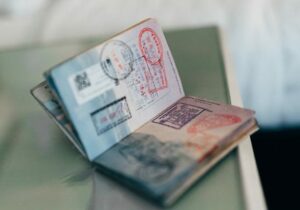Dual citizenship, or holding legal nationality in two countries, continues to grow. Over 76% of nations now permit it, up from just 33% in 1960.
Dual citizens benefit from expanded travel freedom, access to healthcare and education, economic flexibility, and stronger family ties. But they also face challenges: double taxation, military obligations, immigration complexity, and “conflict of interest” for sensitive roles.
Whether acquired by descent, marriage, naturalization, or Citizenship by Investment, understanding this evolving landscape, including compliance with tax authorities, immigration authorities, and government agencies, is essential for individuals seeking a truly global lifestyle.
What is dual citizenship?
Dual citizenship allows an individual to be a citizen of two countries at the same time. This status can be obtained through birth, descent, marriage, or residency programs like citizenship by investment. Multiple countries provide tax benefits for dual citizens, such as exemptions on foreign income or reduced tax rates, making it an appealing option for those looking to optimize their tax situation.
Dual citizens enjoy the rights of both countries, including the ability to live, work, and travel freely, along with access to healthcare, education, and social services. However, they must also meet obligations like taxation and potentially military service.
While some countries allow dual citizenship, others may require renouncing one nationality. The rules vary by country, so it’s crucial to understand the legal and tax implications before seeking to obtain citizenship in multiple countries.
Our Global RCBI Report found that dual citizenship is no longer a fringe concept. It has become a strategic tool for individuals seeking travel mobility, security, and economic opportunity in an increasingly volatile world.
Advantages of Dual Citizenship
Dual citizenship, also referred to as dual nationality, offers a wide range of benefits that go beyond holding two passports.
From increased global mobility and tax efficiency to enhanced civil rights and economic opportunity, acquiring a second nationality provides strategic advantages for international individuals and their families.
These benefits are particularly relevant for high-net-worth individuals, digital nomads, and globally mobile professionals seeking greater freedom, legal protection, and financial diversification.
 1. Expanded travel and global mobility
1. Expanded travel and global mobility
The most cited benefit of dual citizenship is access to a second passport, which expands the holder’s visa-free travel options across the globe. Citizens of countries with limited travel privileges can benefit significantly from acquiring a passport from a nation with stronger bilateral agreements.
For example, a U.S. citizen with dual citizenship in Grenada can enjoy visa-free entry to China, New Zealand, and Japan, countries that would otherwise impose strict visa requirements.
Dual passport holders can choose which passport to use based on the most favorable entry conditions, eliminating the need for frequent visa applications and ensuring smoother border crossings.
 2. Cross-border business and economic opportunities
2. Cross-border business and economic opportunities
Having citizenship in two countries allows entrepreneurs and investors to operate businesses, open bank accounts, and access local markets with fewer restrictions.
Dual citizens can take advantage of favorable tax regimes, investment incentives, and government programs for startups in multiple countries. This flexibility is particularly useful when choosing the most economically stable or business-friendly environment to launch or expand a company.
Moreover, financial institutions in some countries offer more favorable loan conditions and investment products to citizens, giving dual nationals a competitive edge.
 3. Enhanced civil rights and political participation
3. Enhanced civil rights and political participation
Dual nationality gives individuals the full spectrum of citizenship rights in both countries, including the ability to vote, run for office (where permitted), access courts, and obtain government services.
In many countries, only full citizens are permitted to own real estate without restrictions, making dual citizenship advantageous for property investors or expatriates looking to secure assets abroad.
Compared to permanent residents, dual citizens often enjoy broader legal protections, inheritance rights, and the ability to influence policy through civic engagement.
 4. Access to dual healthcare systems
4. Access to dual healthcare systems
Holding citizenship in two nations grants access to two public healthcare systems, giving dual citizens more choice and flexibility in seeking medical treatment. This can result in reduced medical expenses, better service quality, and access to advanced care.
For example, someone with US dual citizenship with Ireland can use Ireland’s universal healthcare system, reducing dependence on expensive private insurance in the U.S. This is particularly beneficial for retirees, long-term travelers, or individuals with chronic conditions who want access to more affordable or specialized care abroad.
 5. Affordable and accessible higher education
5. Affordable and accessible higher education
Dual citizens can study in either country as domestic students, often paying lower tuition fees than foreign nationals. This advantage opens the door to top-tier universities, national grants, and government-funded learning programs.
The European Union includes some of the countries with the best education and citizens can attend public universities in other EU countries at little to no cost, making dual EU citizenship particularly appealing for families.
Children of dual nationals can also qualify for scholarships and access vocational training, apprenticeships, and educational subsidies in both countries.
 6. Tax optimization and residency planning
6. Tax optimization and residency planning
For globally mobile individuals, dual citizenship can support tax planning strategies by allowing them to legally reside in countries with territorial taxation or no income tax. Moving to one of the countries with no income tax like St. Kitts and Nevis, the UAE, and Vanuatu is an ideal wealth protection option.
By leveraging double taxation agreements (DTAs) or establishing your country of tax residence in the more favorable tax system, dual citizens can lawfully reduce their global tax liability. However, this must be done in consultation with tax advisors to avoid penalties and ensure compliance with both countries’ tax authorities.
 7. Security, stability, and diplomatic protection
7. Security, stability, and diplomatic protection
Holding a Plan B passport through dual citizenship enhances personal security, especially in times of political unrest, travel bans, or emergencies. It provides access to consular support and legal assistance from either country’s diplomatic missions. In situations like conflict zones, pandemics, or civil crises, having a second nationality can be a lifesaving exit strategy.
Moreover, dual citizens can access social welfare benefits, pension systems, and legal protection in both countries, offering a financial and legal safety net in uncertain times.
Disadvantages of Dual Citizenship
While dual citizenship offers numerous lifestyle and financial advantages, it also comes with significant legal, tax, and administrative challenges.
Navigating multiple legal systems, fulfilling obligations to two sets of tax authorities or immigration laws, and handling potential conflicts of interest in sensitive roles can create complexities.
Below are some of the primary drawbacks of holding dual nationality:
1. Double taxation and financial complexity
One of the main concerns for individuals with dual nationality is the potential for double taxation. If there is no Double Taxation Agreement (DTA) between the two countries, dual citizens may be legally required to pay taxes in both countries on the same income.
This is especially problematic in countries with citizenship-based taxation like the United States, which taxes its citizens regardless of where they live.
Navigating multiple tax codes, submitting annual tax returns to multiple tax authorities, and complying with foreign asset reporting obligations can lead to substantial administrative burdens and financial penalties if mismanaged.
2. Career restrictions and government job limitations
Despite having access to more labor markets, dual citizens may face restrictions in sectors involving national security or public trust, such as defense, intelligence, or high-level government roles.
Many governments impose nationality conditions for roles like judges, ministers, elected officials, or military personnel to avoid any conflict of interest.
In some cases, holding multiple nationalities can limit an individual’s eligibility for certain security clearances or government-sponsored contracts, especially in countries with strained diplomatic relations.
3. Military service obligations
Although not all countries enforce mandatory military service, those that do may expect dual nationals to serve, regardless of their residence status. This can cause complications when both countries require service or prohibit military participation in foreign states.
Some countries do not permit their citizens to serve in a foreign military, and doing so may result in the loss of citizenship, fines, or legal consequences.
These obligations often surface unexpectedly when a dual citizen reaches the legal age for national service or attempts to enter or exit the country under scrutiny.
4. Legal conflicts and regulatory overlap
Dual citizens are subject to the laws of two nations simultaneously. This can create serious legal conflicts, especially when it comes to taxation, inheritance, labor rights, or property laws. For example, family or business arrangements considered legal in one country may be invalid or even punishable in the other.
When laws between countries clash, the individual is left navigating a legal gray area and they must often hire legal professionals or immigration lawyers to resolve disputes or stay compliant.
5. Complicated immigration and exit procedures
Having dual nationality doesn’t always simplify immigration. In fact, some countries require dual citizens to use a specific passport for entry or exit.
Others have limitations on renunciation of citizenship or impose exit bans in politically unstable periods. These restrictions can create significant travel delays or legal issues at border crossings.
Additionally, dual citizens moving back to one of their countries of origin may be subject to residency permits, reacquisition procedures, or administrative barriers that wouldn’t apply to single-nationality citizens.
6. Cultural identity, loyalty, and unequal government support
For some, holding multiple citizenships raises questions of identity, loyalty, and national alignment. This is particularly challenging when the two countries of citizenship are in diplomatic conflict, or when cultural expectations diverge significantly.
Furthermore, some government agencies or social welfare systems may not provide the same level of support to dual citizens. In cases of emergency or legal trouble, dual nationals may also experience limited embassy assistance if they are in the country of their other citizenship.
How to Get Dual Citizenship
Citizenship by birthright

Birthright citizenship is typically determined by jus soli (based on the place of birth) or jus sanguinis (based on blood relatives).
A child born to a foreign-citizen parent may acquire citizenship from their birth country and the other citizenship from their parent. Although this may seem straightforward, some countries with birthright citizenship have a few conditions.
Citizenship by descent
Although typically considered birthright citizenship, those who receive citizenship by birthright generally do so by submitting a citizenship application after birth. Citizenship by descent involves proving one’s ties to a country through one’s family history in a direct line. In many countries, like Bulgaria, Finland, Poland, and Italy, family members include grandparents and great-grandparents.
Citizenship by naturalization
The citizenship by naturalization process is the primary way foreign nationals gain citizenship in other countries they have no familial ties. The eligibility requirements generally involve living in the country for a minimum period and can include proving language proficiency and knowledge of the country’s history and customs.
Citizenship by marriage
Citizenship by marriage is another common and easy route to dual nationality. Marriage to a citizen often excludes the requirements for typical naturalization, such as the length of residence, language proficiency, and merits based on other point-scoring factors like paid taxes and employment.
Citizenship by investment
Citizenship by investment (CBI) is a legal pathway allowing foreigners to acquire dual citizenship in a foreign country by contributing to its economy or image. This form of migration has become increasingly popular for those seeking dual citizenship.
Economic citizenship involves making qualifying investments like real estate, government bonds, or businesses based on a country’s requirements. Once the criteria are met and due diligence checks are cleared, applicants and their families can obtain citizenship and second passports, granting them the benefits of dual citizenship.
Citizenship by Investment Countries
Citizenship by investment is one the easiest and most streamlined ways of obtaining a second passport. These are some of the best countries offering citizenship through investment with some of the shortest processing times.
Country | Minimum Investment | Residency Requirement | Time to Citizenship |
Turkey | $400,000 | none | 3 to 6 months |
Malta | €690,000 | None (but maintain investment) | 14 to 36 months |
St. Kitts and Nevis | $250,000 | None (investment must be maintained) | 4 to 6 months |
Antigua and Barbuda | $230,000 | 5 days | 6 to 9 months |
Dominica | $200,000 | None (investment must be maintained) | 6 to 9 months |
Vanuatu | $130,000 | None (investment must be maintained) | 3 months |
Grenada | $235,000 | None (investment must be maintained) | 6 months |
Saint Lucia | $240,000 | None (investment must be maintained) | 10 to 12 months |
Can Americans obtain dual citizenship?

For those looking for permanent residency or citizenship abroad, it’s important to understand the necessary forms for residency, naturalization, or investment programs. For example, U.S. citizens applying for residency in countries like Canada or through EU residency programs must complete forms like visa applications and residency requests.
If gaining citizenship through naturalization in another country, U.S. citizens must comply with U.S. laws, including tax implications. They must also submit forms like IRS Form 8854 if they plan to renounce U.S. citizenship.
Key Takeaways about Dual Citizenship
Dual citizenship is a powerful tool for enhancing global mobility, security, and opportunities, allowing access to multiple passports that can significantly improve your quality of life. It provides benefits like visa-free travel, economic flexibility, and the ability to live, work, or study in more than one country.
There are several tools to help people find the most powerful passports, like the Global Citizen Solutions Global Passport Index. However, it’s important to weigh the potential downsides like double taxation, military service obligations, or political conflicts.
- Pros: Dual citizenship provides security, flexibility in residence, and enhanced access to education, healthcare, and financial systems.
- Cons: It may require fulfilling tax and legal duties in both countries and can complicate international legal matters.
- Paths: Methods to dual citizenship include ancestry, marriage, naturalization, or investment programs in countries like Malta or St. Kitts & Nevis.
How Can Global Citizen Solutions Help You?
Global Citizen Solutions is a boutique migration consultancy firm with years of experience delivering bespoke residence and citizenship by investment solutions for international families. With offices worldwide and an experienced, hands-on team, we have helped hundreds of clients worldwide acquire citizenship, residence visas, or homes while diversifying their portfolios with robust investments.
We guide you from start to finish, taking you beyond your citizenship or residency by investment application.

Frequently Asked Questions about the Pros and Cons of Dual Citizenship
Does dual citizenship mean more taxes?
It depends on the countries involved. Dual citizens may be subject to taxation in both countries, especially if one follows citizenship-based taxation (like the U.S.).
Without a double taxation agreement, individuals could owe taxes on the same income to two tax authorities. Strategic tax residency planning can reduce this risk.
Which countries allow dual citizenship?
The United States, Canada, the United Kingdom, Ireland, France, Portugal, and Australia are just some of the countries that allow dual citizenship. Others, like India and China, do not recognize dual nationality.
Can I lose my citizenship if I get another one?
In some cases, yes. If your home country does not recognize dual citizenship, acquiring a second nationality may result in the loss of your original citizenship. Always review the laws of both countries before applying for a second passport to avoid unintended consequences.
Can dual citizenship be passed on to children?
Yes, many countries allow dual citizens to pass on citizenship to their children through a process called citizenship by descent. The rules vary by country, and some may limit transmission to one or two generations born abroad.
Are there any jobs I can’t do with dual citizenship?
Yes, dual citizens may be restricted from holding sensitive government or military roles, especially in intelligence, defense, or diplomatic services. These positions often require a security clearance or a sole allegiance to one country to avoid conflicts of interest.
How many citizenships can a person have?
There is no universal limit to how many citizenships you can have. Some individuals have three or more passports, depending on the nationality laws of each country. As long as each country permits multiple citizenships, you can retain them legally.
What’s the difference between a second passport and dual citizenship?
A second passport is a travel document that confirms citizenship in another country, while dual citizenship refers to the legal status of holding nationality in two countries.
All dual citizens have two passports, but not everyone with a second passport qualifies as a dual citizen under the law.
Why does the US not encourage dual citizenship?
The United States does not explicitly encourage multiple citizenship primarily because it can create complexities in matters such as taxation, military service obligations, and conflicting allegiances.


